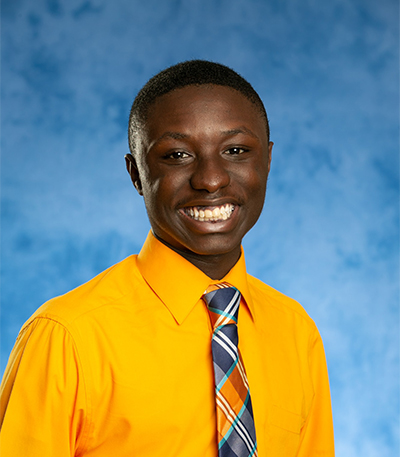Political Science graduate finds his purpose on McNichols Campus
 This series of stories celebrates the achievements of standout students in University of Detroit Mercy's Class of 2021.
This series of stories celebrates the achievements of standout students in University of Detroit Mercy's Class of 2021.
Dalonzo Curges knew he belonged at University of Detroit Mercy from the moment he stepped foot on the McNichols Campus.
“I loved the environment, people and faculty and staff, and I immediately felt welcomed when I came onto campus,” he said. “I also admired and enjoyed the small class sizes and the one-on-one personal connection that I could get with my professors.”
Helping others feel equally welcome and making a difference at the University have been priorities for Curges, who graduates this May with a Bachelor of Arts in Political Science and minors in Leadership and Business Law.
Curges has served as president of the Black Student Union and director of Diversity and Inclusion for Student Government Association. He’s mentored peers through TRIO Student Support Services and his role as a residential advisor. He’s volunteered in the community and assisted on planning committees for Detroit Mercy’s strategic plan and its Martin Luther King, Jr. and Black History Month celebrations.
“When I first came, I wasn't really involved, because I was trying to feel myself out and decide what I wanted to do. How did I want to get involved on campus, what were the organizations I felt passionate about,” Curges said. “As I got into my sophomore year, I saw that there was so much more I could do. After that, it was very important for me to get involved and figure out what ways I can make change on campus.”
Curges feels his impact has been felt on those planning committees, where he provided student feedback. He promoted the need for an Office of Diversity and Inclusion at Detroit Mercy with the strategic plan, and developed an African American church service for Black History Month in 2019, the latter being one of his favorite memories from his time at the University.
“That’s one of many, but that was probably the one that has most stuck with me, as I was able to unify people together religiously to understand the African American traditions,” Curges said. “That was probably one of my fondest memories of all.”
Faith is incredibly important to Curges, who served as an intern for University Ministry this academic year. He says faith serves as his guiding principal, and he takes pride in being able to bring together those from different denominations during his time at Detroit Mercy.
Last spring, Curges joined his peers on a service immersion trip to Alabama. Immersions are key experiences of a transformative Jesuit and Mercy education rooted in social justice, and they offer students the opportunity to work for the common good, encounter new realities and reflect on their experiences in the context of a diverse community.
Curges’ trip was focused on the Civil Rights Movement in Alabama and featured stops in Selma, Montgomery and Birmingham, which played prominent roles in the movement during the 1960s.
 His group walked across the Edmund Pettus Bridge, made famous by the “Bloody Sunday” voting rights march, and visited the National Voting Rights Museum and Institute in Selma, 16th Street Baptist Church in Birmingham and the Equal Justice Initiative’s Legacy Museum, the Freedom Rides Museum and Martin Luther King, Jr.’s house in Montgomery.
His group walked across the Edmund Pettus Bridge, made famous by the “Bloody Sunday” voting rights march, and visited the National Voting Rights Museum and Institute in Selma, 16th Street Baptist Church in Birmingham and the Equal Justice Initiative’s Legacy Museum, the Freedom Rides Museum and Martin Luther King, Jr.’s house in Montgomery.
“It was just the most life-changing experience,” Curges said.
Studying Political Science at Detroit Mercy was an easy decision for Curges. He believed it was the best way for him to make effective societal changes with one of his passions, racial justice. There are several different ways Curges says he can do just that: becoming involved with organizations like the NAACP or National Urban League, or by getting into politics.
Next up for Curges, though, is graduate school, where he plans to study either public policy or public administration.
He is confident his Detroit Mercy education and experience will be helpful throughout his career, but it is the connections he made with professors while at the McNichols Campus that stand out.
Curges said two faculty members — Associate Professor of Political Science and Director of the African American Studies program Alex Zamalin and Associate Professor and Chair of Political Science Genevieve Meyers — were instrumental to his undergraduate career.
“Dr. Meyers helps me look at papers with structuring,” he said. “We’ll talk about my next goals and plans, especially with grad school. We had talked for years about how this was what I really wanted to do. She was telling me these are the different programs and these are the different things, helping guide me in that direction. So, having that relationship and being able to go and talk to her about different situations, different problems within life and things just happening in the public policy realm or the political science realm is something that I appreciate.
“And the same thing with Dr. Zamalin, he’s very helpful in writing and is passionate in teaching me about racial justice, giving me book lists and constantly talking about how these are different problems and how can we come to that common goal of fixing these problems. I just really value those conversations that we’ve had.”
Curges’ time at Detroit Mercy is coming to an end, but he appreciates all he was able to experience over the past four years.
“The education you get here is second to none,” Curges said. “You get the one-on-one, personalized attention with the professors. You won’t be lost in the numbers; you can actually get to know your professors more comfortably and they’ll make sure you succeed. I’m glad I came here because they’ve made sure that I succeed and I achieved my best while I was here.
“It’s like a family here. It’s a close-knit community. You make friends and have that family-like atmosphere that you feel accepted, you feel wanted, no matter who you are, how you are or what you want to do. This is the perfect place as well, if you see something here that’s not here at Detroit Mercy, a club or an organization, you can make it happen here.”
— By Ricky Lindsay. Follow Detroit Mercy on Facebook, Twitter and Instagram. Have a story idea? Let us know by submitting your idea.
